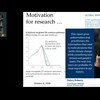ecological
For Whose Benefit? The Biological and Cultural Evolution of Human Cooperation
Springer, New York. DOI: 10.1007/978-3-319-50874-0 This book takes the reader on a journey, navigating the enigmatic aspects of cooperation; a journey that starts inside the body and continues via our
Parity and Mortality: An Examination of Different Explanatory Mechanisms Using Data on Biological and Adoptive Parents
European Journal of Population, Volume 35, Issue 1, pp 63–85. doi.org/10.1007/s10680-018-9469-1 Abstract A growing literature has demonstrated a relationship between parity and mortality, but the explana
Modelling Social Mechanisms for Knowledge Generation & Exploration
Nanda Wijermans, Stockholm Resilience Centre Human behaviour is a complex phenomenon with a lot of open questions. Computational modelling can support the scientific quest for more understanding of hum

Julia Steinberger: Is it possible to live well within planetary limits? Evidence and modelling from the LiLi project
Professor Julia Steinberger researches and teaches in the interdisciplinary areas of Ecological Economics and Industrial Ecology. Her research examines the connections between resource use (energy and
Domain-specific tightness: Why is Sweden perceived as tighter than the United States?
Current research in ecological and social psychology, vol 3 Abstract The tightness of a society is defined as the strength of social norms and the degree of sanctioning within the society. However, a so
Partha Dasgupta: Earth's Carrying Capacity and Optimum Global Population
Sir Partha Dasgupta, Professor Emeritus of Economics at the University of Cambridge. ABSTRACT In this lecture I study fertility choice in the face of socio-ecological constraints. I assume that when cho
The Origins and Maintenance of Female Genital Modification across Africa
Bayesian Phylogenetic Modeling of Cultural Evolution under the Influence of Selection Human Nature, 27(2), 173-200. DOI 10.1007/s12110-015-9244-5 Abstract We present formal evolutionary models for the oristratification appear to play a more important role in the cross-cultural distribution of FGMo. To explain these cases, one must consider cultural evolutionary explanations in conjunction with behavioral ecological ones.We conclude with a discussion of the implications of our study for policies designed to end the practice of FGMo.
A popular misapplication of evolutionary modeling to the study of human cooperation
Evolution and Human Behavior, Volume 38, Issue 3, Pages 421–427. Abstract To examine the evolutionary basis of a behavior, an established approach (known as the phenotypic gambit) is to assume that the b
Dark side of resilience: systemic unsustainability
Frontiers in Sustainability vol 4 Abstract Resilience is often presented as a championing solution for tackling the multi-level environmental, security, health, and financial threats facing the whole hum
Still heating: Unfolding a typology of climate obstruction
In N. Marschner, C. Richter, J. Patz, & A. Salheiser (Eds.), Contested climate justice – Challenged democracy: International perspectives (pp. 59-71). Campus Verlag GmbH Abstract Earth is on a catastryet, there is little sign of halting the rise of global greenhouse gas emissions orstopping the extraction of fossil fuels. Against this background, in this articlewe re-engage with a recently proposed typology supposed to cover three modesthrough which effective climate action has been obstructed. These are, first,primary obstruction, that is, the spread of disinformation and/or denying the veryexistence of anthropogenic climate change. Second, secondary obstruction concernsmore or less deliberate obstruction via opposition to climate action and policiesvia, for example, reference to “the threat of deindustrialisation”. Finally, tertiaryobstruction denotes modes of living which, while not necessarily obstructingeffective climate change intentionally, concerns “living in denial”. Drawing onrecent research and examples, we revisit this typology.








